THREAD
Today the CQC has published “Out of sight – who cares? A review of restraint, seclusion and segregation for autistic people, and people with a learning disability and/or mental health condition”.
Start with conclusions: #humanrights are NOT being upheld
#OutOfSight
Today the CQC has published “Out of sight – who cares? A review of restraint, seclusion and segregation for autistic people, and people with a learning disability and/or mental health condition”.
Start with conclusions: #humanrights are NOT being upheld
#OutOfSight
2.
Welcome @CareQualityComm opening: “Restrictive Practice is a human rights issue” and @AQuinnUnbroken sharing her story (if you don& #39;t follow Alexis you should).
People & their rights MUST be the starting point for any discussion, policy, law or decision on restraint.
Welcome @CareQualityComm opening: “Restrictive Practice is a human rights issue” and @AQuinnUnbroken sharing her story (if you don& #39;t follow Alexis you should).
People & their rights MUST be the starting point for any discussion, policy, law or decision on restraint.
3.
This is a much-needed development in the CQC& #39;s previous reports, including within this review which have tended to be "and human rights".
This is a much-needed development in the CQC& #39;s previous reports, including within this review which have tended to be "and human rights".
4.
If we do not name restraint as a human rights issue, the frame of reference becomes something to be done to people without limits, rather than something which may breach people’s legally protected rights, rights which staff have a legal duty to respect and protect.
If we do not name restraint as a human rights issue, the frame of reference becomes something to be done to people without limits, rather than something which may breach people’s legally protected rights, rights which staff have a legal duty to respect and protect.
5.
Human rights lens more integrated into analysis: “undignified and inhumane care [Article 3, HR Act], in hospital and care settings where people were seen not as individuals but as a condition or a collection of negative behaviours."
Human rights lens more integrated into analysis: “undignified and inhumane care [Article 3, HR Act], in hospital and care settings where people were seen not as individuals but as a condition or a collection of negative behaviours."
6.
V nature of mental health hospitals distressing for people with a LD and/or autistic people, incl physical environments & lack of psychological support.
General hospital = treatment plans on admission
Here = people admitted with no assessment, treatment, discharge plan
V nature of mental health hospitals distressing for people with a LD and/or autistic people, incl physical environments & lack of psychological support.
General hospital = treatment plans on admission
Here = people admitted with no assessment, treatment, discharge plan
7.
Huge issues around lack of training but ALSO importantly supervision and support of staff. This means people’s needs are not being meet, increasing the risk to their rights through the use of restraint, seclusion, segregation.
Huge issues around lack of training but ALSO importantly supervision and support of staff. This means people’s needs are not being meet, increasing the risk to their rights through the use of restraint, seclusion, segregation.
8.
Access to high-quality advocacy is vital to make sure that people can raise concerns about their care, including serious concerns that may amount to human rights breaches. Whilst Codes of Practice contain duties around advocacy, people’s reality is very different https://abs.twimg.com/emoji/v2/... draggable="false" alt="⬇️" title="Pfeil nach unten" aria-label="Emoji: Pfeil nach unten">
https://abs.twimg.com/emoji/v2/... draggable="false" alt="⬇️" title="Pfeil nach unten" aria-label="Emoji: Pfeil nach unten">
Access to high-quality advocacy is vital to make sure that people can raise concerns about their care, including serious concerns that may amount to human rights breaches. Whilst Codes of Practice contain duties around advocacy, people’s reality is very different
9.
But at @BIHRhumanrights we know advocates (incl self advocates) need support too. Their role needs to be understood and valued. They too need support to have the knowledge and confidence to raise concerns as human rights issues, using the power of "unlawfulness" to challenge.
But at @BIHRhumanrights we know advocates (incl self advocates) need support too. Their role needs to be understood and valued. They too need support to have the knowledge and confidence to raise concerns as human rights issues, using the power of "unlawfulness" to challenge.
10.
Whilst the findings, the experiences shared by people who should be being cared for, are not surprising for those of us living and working in the system, they are ALWAYS shocking and gut wrenching. We should all be saddened, but that must be galvanised into action.
Whilst the findings, the experiences shared by people who should be being cared for, are not surprising for those of us living and working in the system, they are ALWAYS shocking and gut wrenching. We should all be saddened, but that must be galvanised into action.
11.
Erik& #39;s life is NOT a one-off. There are many people who have been consigned to living a life this.
I cannot, will not, ever understand or accept that this is acceptable.
How this is still happening, years and years and years after reviews have said it should not?
Erik& #39;s life is NOT a one-off. There are many people who have been consigned to living a life this.
I cannot, will not, ever understand or accept that this is acceptable.
How this is still happening, years and years and years after reviews have said it should not?
12.
Working on #humanrights in the UK people often say to me, well it isn& #39;t as bad as country X.
#humanrights isn& #39;t a competition for who is doing least worst. They are about EVERYONE living dignified and equal lives.
And that simply does not happen. #OutOfSight is too apt.
Working on #humanrights in the UK people often say to me, well it isn& #39;t as bad as country X.
#humanrights isn& #39;t a competition for who is doing least worst. They are about EVERYONE living dignified and equal lives.
And that simply does not happen. #OutOfSight is too apt.
13.
Let that https://abs.twimg.com/emoji/v2/... draggable="false" alt="⬆️" title="Pfeil nach oben" aria-label="Emoji: Pfeil nach oben">sink in. Of 66 people whose care was reviewed in depth only 3 - THREE - had consistently good care.
https://abs.twimg.com/emoji/v2/... draggable="false" alt="⬆️" title="Pfeil nach oben" aria-label="Emoji: Pfeil nach oben">sink in. Of 66 people whose care was reviewed in depth only 3 - THREE - had consistently good care.
THREE. OUT. OF. 66.
Let that
THREE. OUT. OF. 66.
14.
BUT the report also shows that it is possible to get even the most complex care right. Funding is a maze and there are staff shortages/skills-sets.
BUT it can be done. It is done best in people’s communities, close to where they live & accessible when needed - #humanrights
BUT the report also shows that it is possible to get even the most complex care right. Funding is a maze and there are staff shortages/skills-sets.
BUT it can be done. It is done best in people’s communities, close to where they live & accessible when needed - #humanrights
15.
Bethany’s story is shared as a example of what is possible.
But it is also a reminder this was only possible following years of horrendous treatment (read: human rights violations) & @JeremyH09406697 fighting for the everyday dignity of being able to live an ordinary life.
Bethany’s story is shared as a example of what is possible.
But it is also a reminder this was only possible following years of horrendous treatment (read: human rights violations) & @JeremyH09406697 fighting for the everyday dignity of being able to live an ordinary life.
16.
How, in this day and age, can it be that campaigning and media coverage (not commissioning and accountability) is the route to securing support which meets rather than breaches the human rights of people with learning disabilities and/or Autistic people?
How, in this day and age, can it be that campaigning and media coverage (not commissioning and accountability) is the route to securing support which meets rather than breaches the human rights of people with learning disabilities and/or Autistic people?
17.
The report notes what we all know: families & staff are clear that if Autistic people, and people with a LD and/or mental health condition got the right help and support earlier, or when in crisis, they may not have needed hospital care (& get trapped in institutions)
The report notes what we all know: families & staff are clear that if Autistic people, and people with a LD and/or mental health condition got the right help and support earlier, or when in crisis, they may not have needed hospital care (& get trapped in institutions)
18.
Human rights abuses are NOT inevitable. It is within the power of those commissioning, leading & delivering services to not do this.
Upholding human rights, incl preventing breaches of them, shd be the starting point. NOT for describing things after they have gone wrong.
Human rights abuses are NOT inevitable. It is within the power of those commissioning, leading & delivering services to not do this.
Upholding human rights, incl preventing breaches of them, shd be the starting point. NOT for describing things after they have gone wrong.
Commissioning, commissioning, commissioning – this is a HUGE issue.
As the report notes there is a huge amount of public ££ spent on keeping people in institutions.
Funding & control is a maze; 12 yrs of working in health & care and I still don’t understand how this continues
As the report notes there is a huge amount of public ££ spent on keeping people in institutions.
Funding & control is a maze; 12 yrs of working in health & care and I still don’t understand how this continues
20.
Range of report recommendations incl this one https://abs.twimg.com/emoji/v2/... draggable="false" alt="⬇️" title="Pfeil nach unten" aria-label="Emoji: Pfeil nach unten">
https://abs.twimg.com/emoji/v2/... draggable="false" alt="⬇️" title="Pfeil nach unten" aria-label="Emoji: Pfeil nach unten">
Not self promotion, the point is Com& #39;ers must start from basis their job is to ensure respect & protection of people’s human rights: physical & mental wellbeing, family life, autonomy, equality, liberty (sadly even lives)
Range of report recommendations incl this one
Not self promotion, the point is Com& #39;ers must start from basis their job is to ensure respect & protection of people’s human rights: physical & mental wellbeing, family life, autonomy, equality, liberty (sadly even lives)
21.
Also VERY important the CQC’s improves its own regulatory approach. Regulation and monitoring should be a powerful driver for changing cultures and approaches within health and social care; this must also be about putting people and their rights front and centre.
Also VERY important the CQC’s improves its own regulatory approach. Regulation and monitoring should be a powerful driver for changing cultures and approaches within health and social care; this must also be about putting people and their rights front and centre.
22.
The CQC report can be found here: https://www.cqc.org.uk/publications/themed-work/rssreview
https://www.cqc.org.uk/publicati... href="https://twtext.com//hashtag/OutOfSight"> #OutOfSight
I know this Thread has become long! But I want to end flagging some of BIHR& #39;s resources:
The CQC report can be found here: https://www.cqc.org.uk/publications/themed-work/rssreview
I know this Thread has become long! But I want to end flagging some of BIHR& #39;s resources:
23.
Finally, the report references some of our resources, including our guide on Learning Disability, Autism and Human Rights.
You can download it here (sorry we are out of printed copies and have no more funding to reprint)
https://www.bihr.org.uk/Handlers/Download.ashx?IDMF=5867be08-7d9e-42d1-8fb5-f94770df85cf">https://www.bihr.org.uk/Handlers/...
Finally, the report references some of our resources, including our guide on Learning Disability, Autism and Human Rights.
You can download it here (sorry we are out of printed copies and have no more funding to reprint)
https://www.bihr.org.uk/Handlers/Download.ashx?IDMF=5867be08-7d9e-42d1-8fb5-f94770df85cf">https://www.bihr.org.uk/Handlers/...
BUT! We have co-produced a series of short videos based on the guide with the wonderful folks @mencapliverpool
This introduces human rights & how people with LD and/or Autistic people can use their human rights when accessing care & treatment https://youtu.be/h21MIpBDSMg ">https://youtu.be/h21MIpBDS...
This introduces human rights & how people with LD and/or Autistic people can use their human rights when accessing care & treatment https://youtu.be/h21MIpBDSMg ">https://youtu.be/h21MIpBDS...
25.
TRIGGER WARNING: this video covers the right to life by telling Bryn’s story who was refused treatment because he had complex learning disabilities https://youtu.be/JpnN3X-SWv4 ">https://youtu.be/JpnN3X-SW...
TRIGGER WARNING: this video covers the right to life by telling Bryn’s story who was refused treatment because he had complex learning disabilities https://youtu.be/JpnN3X-SWv4 ">https://youtu.be/JpnN3X-SW...
Ends/
This video about non-discrimination and being able to talk about human rights when being treated unfairly by services.
Thanks to Adam, Theresa, Sophie, Adam, Anne, Paul and Charlotte for their work with @CarlynSMiller on these https://youtu.be/tDeANTxDsL4 ">https://youtu.be/tDeANTxDs...
This video about non-discrimination and being able to talk about human rights when being treated unfairly by services.
Thanks to Adam, Theresa, Sophie, Adam, Anne, Paul and Charlotte for their work with @CarlynSMiller on these https://youtu.be/tDeANTxDsL4 ">https://youtu.be/tDeANTxDs...

 Read on Twitter
Read on Twitter
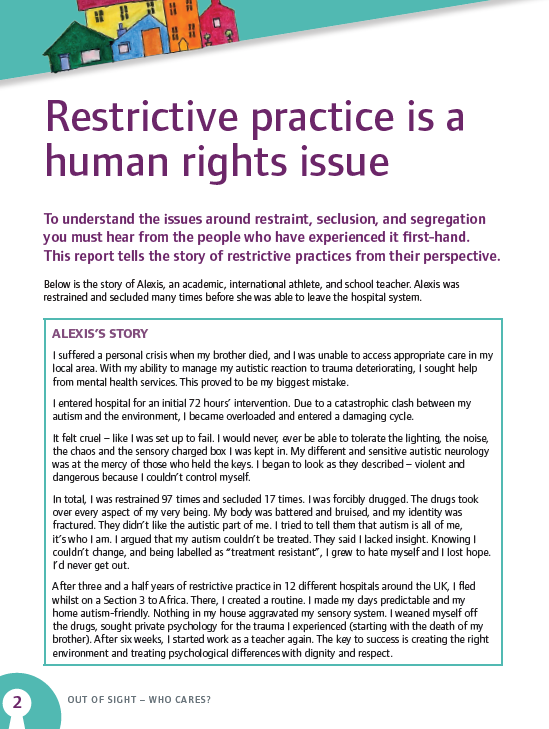
 " title="8.Access to high-quality advocacy is vital to make sure that people can raise concerns about their care, including serious concerns that may amount to human rights breaches. Whilst Codes of Practice contain duties around advocacy, people’s reality is very different https://abs.twimg.com/emoji/v2/... draggable="false" alt="⬇️" title="Pfeil nach unten" aria-label="Emoji: Pfeil nach unten">" class="img-responsive" style="max-width:100%;"/>
" title="8.Access to high-quality advocacy is vital to make sure that people can raise concerns about their care, including serious concerns that may amount to human rights breaches. Whilst Codes of Practice contain duties around advocacy, people’s reality is very different https://abs.twimg.com/emoji/v2/... draggable="false" alt="⬇️" title="Pfeil nach unten" aria-label="Emoji: Pfeil nach unten">" class="img-responsive" style="max-width:100%;"/>
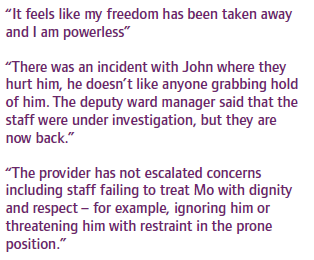
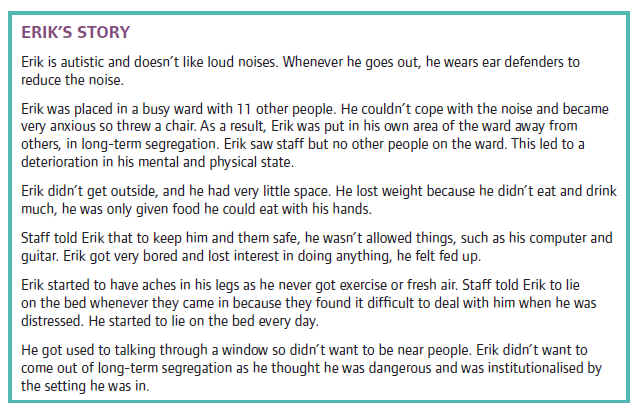
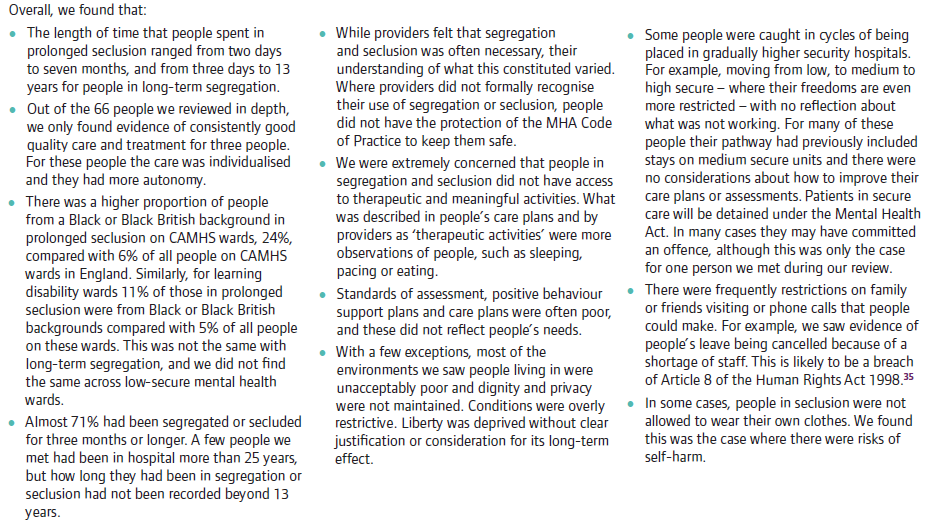


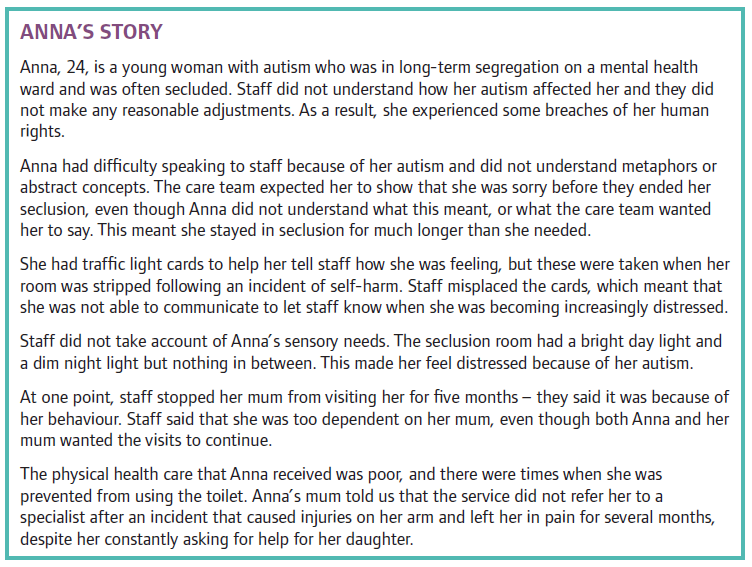

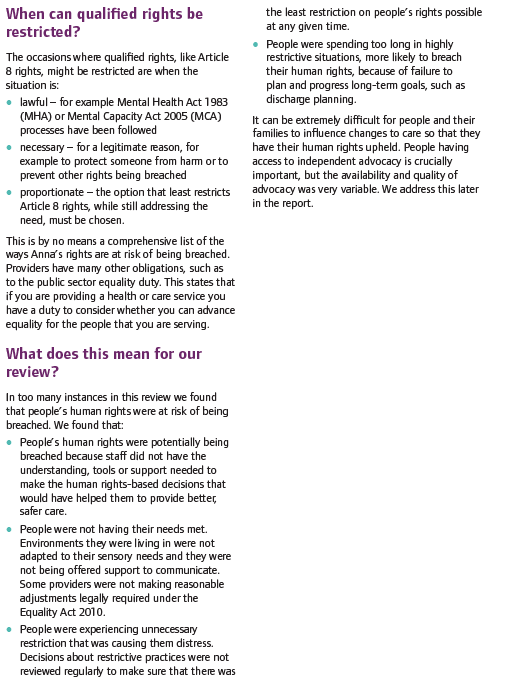
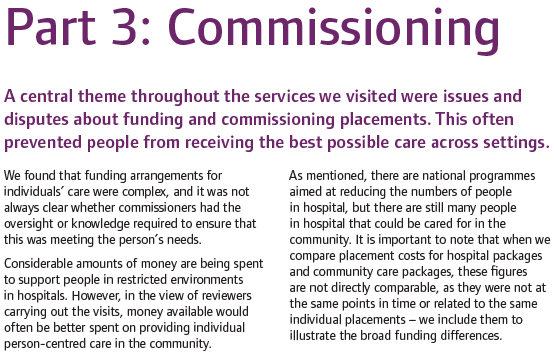
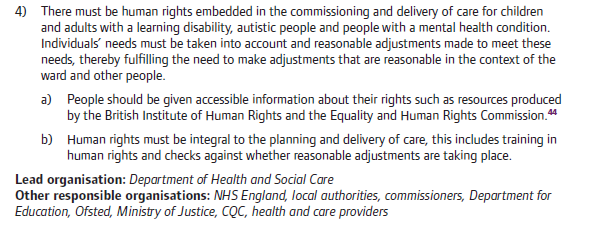 Not self promotion, the point is Com& #39;ers must start from basis their job is to ensure respect & protection of people’s human rights: physical & mental wellbeing, family life, autonomy, equality, liberty (sadly even lives)" title="20. Range of report recommendations incl this onehttps://abs.twimg.com/emoji/v2/... draggable="false" alt="⬇️" title="Pfeil nach unten" aria-label="Emoji: Pfeil nach unten"> Not self promotion, the point is Com& #39;ers must start from basis their job is to ensure respect & protection of people’s human rights: physical & mental wellbeing, family life, autonomy, equality, liberty (sadly even lives)" class="img-responsive" style="max-width:100%;"/>
Not self promotion, the point is Com& #39;ers must start from basis their job is to ensure respect & protection of people’s human rights: physical & mental wellbeing, family life, autonomy, equality, liberty (sadly even lives)" title="20. Range of report recommendations incl this onehttps://abs.twimg.com/emoji/v2/... draggable="false" alt="⬇️" title="Pfeil nach unten" aria-label="Emoji: Pfeil nach unten"> Not self promotion, the point is Com& #39;ers must start from basis their job is to ensure respect & protection of people’s human rights: physical & mental wellbeing, family life, autonomy, equality, liberty (sadly even lives)" class="img-responsive" style="max-width:100%;"/>



